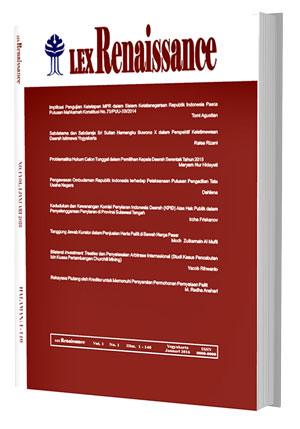Main Article Content
Abstract
Keywords
Article Details
References
- Buku
- Adam, Muhammad, Ilmu Pengetahuan Notariat, Sinar Baru, Bandung 1985.
- Adjie, Habib, Merajut Pemikiran dalam Dunia Notaris & PPAT, Citra Aditya Bakti, Bandung, 2013.
- Adjie Habib, Penafsiran Tematik Hukum Notaris Indonesia (Berdasarkan Undang-Undang Nomor 2 Tahun 2014 Tentang Perubahan Atas Undang-Undang Nomor 30 Tahun 2004 Tentang Jabatan Notaris), Refika Aditama, Bandung, 2015.
- Adjie Habib, Sekilas Dunia Notaris & PPAT Indonesia, Mandar Maju, Bandung, 2009.
- Algra N.E, Gokkel H.R.W – dkk, Kamus Istilah Hukum Fockema Andreae, Belanda Indonesia, Binacipta, Jakarta, 1983.
- Budiono, Herlien, Dasar Teknik Pembuatan Akta Notaris, Citra Aditya Bakti, Bandung.
- Darus, M. Luthfan Hadi, Hukum Notariat dan Tanggungjawab Jabatan Notaris, UII Press, Yogyakarta, 2016.
- Fuady, Munir, Profersi Mulia (Etika Profesi Hukum bagi Hakim, Jaksa, Advokat, Notaris, Kurator, dan Pengurus), Citra Aditya Bakti, Bandung, 2005.
- Harahap, Yahya M, Segi-segi Perjanjian Hukum, Penerbit Alumni, Bandung, 1986.
- Khairandy, Ridwan, Perjanjian Jual Beli, UII Press, Yogyakarta, 2016.
- Mertokusumo, Sudikno (IV), Penemuan Hukum: Sebuah pengantar, Liberty, Yogyakarta, 2009.
- Notodisoerjo, Reden Soegondo, Hukum Notariat di Indonesia: Suatu Penjelasan, Cetakan kedua, Raja Grafindo Persada, Jakarta, 1993.
- Sudarsono, Kamus Hukum, Rieneka Cipta, Jakarta, 2007.
- Internet
- Perlindungan Hukum Notaris, http://law.ui.ac.id/v3/perlunya-perlindungan-hukum-terhadap-jabatan-notaris, 16 Oktober 2018, 18:10 WIB
- Peraturan Perundang-Undangan
- Kitab Undang-Undang Hukum Perdata.
- Undang-Undang Nomor 30 Tahun 2004 tentang Jabatan Notaris.
- Undang-Undang Nomor 2 Tahun 2014 tentang Jabatan Notaris.
References
Buku
Adam, Muhammad, Ilmu Pengetahuan Notariat, Sinar Baru, Bandung 1985.
Adjie, Habib, Merajut Pemikiran dalam Dunia Notaris & PPAT, Citra Aditya Bakti, Bandung, 2013.
Adjie Habib, Penafsiran Tematik Hukum Notaris Indonesia (Berdasarkan Undang-Undang Nomor 2 Tahun 2014 Tentang Perubahan Atas Undang-Undang Nomor 30 Tahun 2004 Tentang Jabatan Notaris), Refika Aditama, Bandung, 2015.
Adjie Habib, Sekilas Dunia Notaris & PPAT Indonesia, Mandar Maju, Bandung, 2009.
Algra N.E, Gokkel H.R.W – dkk, Kamus Istilah Hukum Fockema Andreae, Belanda Indonesia, Binacipta, Jakarta, 1983.
Budiono, Herlien, Dasar Teknik Pembuatan Akta Notaris, Citra Aditya Bakti, Bandung.
Darus, M. Luthfan Hadi, Hukum Notariat dan Tanggungjawab Jabatan Notaris, UII Press, Yogyakarta, 2016.
Fuady, Munir, Profersi Mulia (Etika Profesi Hukum bagi Hakim, Jaksa, Advokat, Notaris, Kurator, dan Pengurus), Citra Aditya Bakti, Bandung, 2005.
Harahap, Yahya M, Segi-segi Perjanjian Hukum, Penerbit Alumni, Bandung, 1986.
Khairandy, Ridwan, Perjanjian Jual Beli, UII Press, Yogyakarta, 2016.
Mertokusumo, Sudikno (IV), Penemuan Hukum: Sebuah pengantar, Liberty, Yogyakarta, 2009.
Notodisoerjo, Reden Soegondo, Hukum Notariat di Indonesia: Suatu Penjelasan, Cetakan kedua, Raja Grafindo Persada, Jakarta, 1993.
Sudarsono, Kamus Hukum, Rieneka Cipta, Jakarta, 2007.
Internet
Perlindungan Hukum Notaris, http://law.ui.ac.id/v3/perlunya-perlindungan-hukum-terhadap-jabatan-notaris, 16 Oktober 2018, 18:10 WIB
Peraturan Perundang-Undangan
Kitab Undang-Undang Hukum Perdata.
Undang-Undang Nomor 30 Tahun 2004 tentang Jabatan Notaris.
Undang-Undang Nomor 2 Tahun 2014 tentang Jabatan Notaris.




